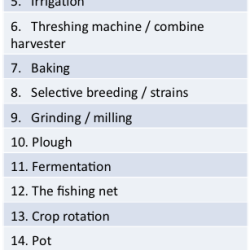Wednesday, October 24, 2012

From hunting and gathering to the birth of agriculture to today’s post-modern world of global food production, technology and engineering have had a profound impact on the relationship between human beings and their dinner plate. I recently recapped the Top 20 Food Inventions in the History of Food and Drink. Will genetic engineering one day appear on the list? Only time will tell.
Food Biotech: Back in the Public’s Eye (Kind Of )
Because of the upcoming vote on Prop 37 in California, which proposes the labeling of foods including genetically modified ingredients, the use of genetic engineering in foods is back on the radar in the US. At least, in some circles. Many of my students and most of my friends have no idea what GMO even means—i.e., genetically modified organism—and I presume many of my readers are in a similar camp.So, whether you live in California (some of us) or eat (all of us), in today’s post I’ve rounded up a few online resources to help inform your thinking about the health and safety considerations of GMOs. (This is part two of three; part one is a terrific hip-hop video that’s very informative in summarizing the salient questions).
Online Resources: Finding the Science
This is a complex topic with lots of opinions, and I’m limiting my list below to just a few resources that generally reflect the scientific iterature as a whole, on behalf of many scientists and studies. Certainly there are many other reputable sources out there, and I encourage you to suss them out (more on this below), but hopefully these will get you off to a good start.
GMOs: Get Science Here
- Food and Agriculture Organization of the United Nations
- World Health Organization
- Center for Science in the Public Interest (I confirmed that this viewpoint is still an accurate reflection of their position)
- Center for Science in the Public Interest (updated report as of 2012)
- American Medical Association (refers specifically to the labeling issue)
- European Food Safety Authority (one example, you can poke around for others)
- Union of Concerned Scientists
- Academy of Nutrition and Dietetics
Academics Reviewprovides an outstanding, comprehensive, meticulously researched review of the science as presented in the popular book Genetic Roulette; it’s a fascinating exposé.(Hint: Don’t believe what you read just because it sounds like science or hits the NYT best seller list.) You might also consider checking out the FAQ by Monsanto. Some of you may have a knee-jerk reaction—and no, I’m not paid by Monsanto, nor do I have any affiliation with the company whatsoever—but I challenge you not to disregard something just because it’s industry. Be skeptical of all information and always ask who is providing the opinion and why. In this case, you might be interested to see that many of Monsanto’s views on the science are shared by reputable scientific organizations.
Be wary of single study sensationalism. A body of literature is needed to show a relationship, not just one study: remember that when you read headlines, which are created to grab your attention. However, if you’re a science-y type of person, you can search the medical and public health literature for the actual study yourself using PubMed. Doesn’t mean studies are equally valid, though, and all studies have limitations. (Kind of like, no one is perfect: it’s just the nature of science and humanity, respectively.) This is why I’m directing you to position papers by major national and international organizations that have often reviewed hundreds of studies. That said, PubMed is the major place medical researchers like me go to search the literature, and you will find many peer-review scientific studies and reviews on the topic. For example, here’s a paper discussing the potential role of biotechnology to address household income, nutrition, and poverty and another discussing the Humanitarian Rice Project. (I’ll talk more about biofortified rice using genetic engineering next time, in case you’re not familiar with this food.)
Fact or Fiction: Where Else Are You Getting Your Information?
Research shows clearly that many people get information about important issues from friends and families, especially when it comes to food and nutrition. We all love our friends—I get it—but I encourage you to be skeptical of what you learn on Facebook, Twitter, and the blogosphere. (An awkward statement, I know, coming from someone who writes on Facebook, Twitter, and the blogosphere.) In many cases those viewpoints are not well-informed and reflect personal values and beliefs. We all have those, of course, but clouding important scientific issues with bias from any perspective without acknowledging them freely is a slippery slope: stop and get the facts before sliding into the sea of anti-science. (But please don’t stop reading my blog due to that ridiculous use of alliteration.) Learn how to sort science from anti-science before accepting the viewpoint you read as fact.
To recap: if you are from California, where your vote will have a very real impact, I do hope you take the time to educate yourself on this issue. And, if you’re not on that other coast (says this New Yorker-slash-Bostonian), you still might want to poke around and see what all the fuss is about. It’s not easy, I know, and next week I’ll post my own FAQ on GMOs in case I can be of help to you in sorting through this complicated topic.
And if you’re here in the US and getting ready to vote in the Presidential election next month, I encourage you to rely on reason rather than rhetoric—whatever the issue.
This is Part 2 in a three-part series on GMOs. Part 1 is here and Part 3 is here.


